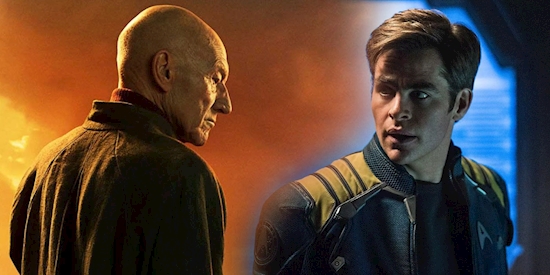How Picard Makes the 2009 Star Trek Reboot Relevant Again
WARNING: The following contains spoilers for "Remembrance," the series premiere ofStar Trek: Picard, streaming now on CBS All Access.
The trilogy of rebooted Star Trek films launched by director J.J. Abrams in 2009 primarily took place in the alternate Kelvin timeline, which repositioned the crew of the original series for new adventures. However, the reboot's inciting incident has surprising ripple effects in the franchise's prime timeline, as seen in the premiere episode of Star Trek: Picard. Both the reboot trilogy and new CBS All Access series springboard from the destruction of Romulus, which is consumed by the supernova of the Hobus star and effectively decimates the once mighty Romulan Star Empire.
Click the button below to start this article in quick view. Start nowThe sheer gravitational force from the supernova sent Spock and the Narada, a Romulan mining ship captained by the villainous Nero, over a century into the past where their actions caused a divergent timeline that was explored in the cinematic trilogy. Picard opens 14 years after the cataclysmic environmental disaster in the prime timeline, with the United Federation of Planets becoming increasingly isolationist in its policies and diminishing its humanitarian efforts due to the sudden influx of millions of Romulan refugees and the violent rise of rogue synthetics -- the universe's term for sentient androids.
The reboot films' inclusion of the supernova was largely used as a plot device to kickstart the divergent timeline while retaining the continuity of the prime timeline that fans had loved for decades. However, Picard -- executive produced by Alex Kurtzman who co-wrote the first two reboot films -- uses that briefly glimpsed event to turn the Federation and Starfleet into a less idealistic, less welcoming organization. The institutions and values Picard fought to uphold and defend his entire life are no longer in line with the Federation because of this incident. This is clear to the venerable Starfleet officer, who had personally led the Federation's rescue mission to aid the Romulans years ago.
In many ways, Picard features clear allusions and parallels to real-world events, from the governments of the world's stance on refugees to the value of lives no matter the nationality or race to concerns over artificial intelligence and the dangers of isolation. Brexit, the Trump Administration and agenda-driven news media all come to mind while watching the premiere episode. Star Trek has always featured a significant amount of social commentary right from the original series' messages on racism, war -- the show was produced during a time when the Vietnam War was at its height -- and more, but Picard features the franchise at its most political.
While the future depicted in Star Trek has always been bright and optimistic in comparison to many of its sci-fi contemporaries, Picard sees shades of gray increasingly creep into its worldview. The ripple effects of the Hobus star's supernova came up throughout the reboot trilogy, from Nero rewriting history by killing James T. Kirk's father and destroying the planet Vulcan to Starfleet's surprise role in drafting the genetically enhanced villain Khan Noonien Singh. For the prime timeline, the effects are more systemic, attacking the core principals upon which the Federation was first founded.
Jean-Luc Picard has always been a man that chose morals and ideals over orders; this was seen constantly in Star Trek: The Next Generation and set up the core conflict of the 1998 film Star Trek: Insurrection. In the new series, the Starfleet Admiral wasn't able to make the Federation remember its moral core, leading to his own disillusionment and retirement. Even 14 years after the destruction of Romulus, the world of Picard wallows and simmers in the consequences of the tragedy, and is made all the better for it.
Star Trek: Picard stars Patrick Stewart, Alison Pill, Michelle Hurd, Evan Evagora, Isa Briones, Santiago Cabrera and Harry Treadaway. The series premiere is available on CBS All Access.
Source: www.cbr.com

